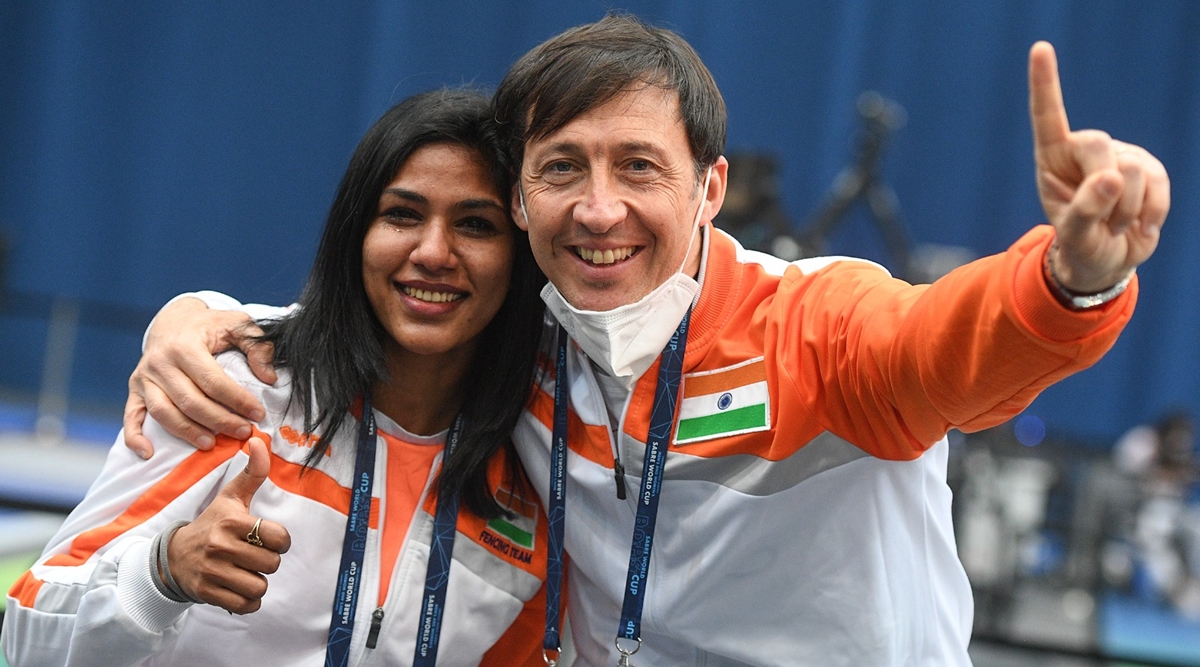 Bhavani Devi celebrating her Tokyo Olympics qualification with one of her coaches. (Twitter/TeamIndia)
Bhavani Devi celebrating her Tokyo Olympics qualification with one of her coaches. (Twitter/TeamIndia) When a young Bhavani Devi’s school in Tamil Nadu introduced fencing as an activity, it was one of five sports that students could choose from. The seniors in the school came to divide the students into groups and get them started on these sports. By the time Bhavani’s turn came, the other four disciplines were full and there was a vacant slot in only one sport. Fencing it would be for her.
Years later, the 27-year-old has qualified for the Tokyo Olympics and is set to take part in the sabre category of the fencing event. Her ticket to Tokyo was printed when South Korea beat Hungary in the quarterfinals of the World Cup in Budapest last Sunday that allowed Bhavani to take the second qualification spot from Asia.
Now that a spot in India’s Olympic campaign is hers, Bhavani looks back at her initial years in fencing and how she was dealt harsh lessons on money and the cost of chasing one’s dreams from a very young age.
“When I joined this sport, the first question they asked students was, ‘How much is your father’s annual income?’ They said fencing is a very expensive sport and one couldn’t afford it if they came from a poor family. At that point, I lied about how much my father was earning in those days,” Bhavani told reporters on a Zoom call.
“It was only later that I understood why that teacher had asked us that question. The swords and the equipment were very expensive. In the beginning, we would practise with bamboo sticks and use our swords in competition only. This was because if we broke the swords, we couldn’t afford to buy them and that process wasn’t easy either because it had to be imported.”
The Dravid factor
And while her initial years in the sport witnessed a constant battle to find sponsors and fund her travels, constant equipment changes and coaching, a lot of those troubles subsided when got sponsored by the GoSports programme – specifically, the Rahul Dravid Mentorship Programme.
It was Dravid who challenged the GoSports team to pick up sports which were not mainstream, and had more girls playing as well as dominating at the national level. GoSports would end up picking up gymnast Dipa Karmakar and Bhavani as part of that mentorship programme.
Bhavani Devi creates history by becoming the first Indian Fencer to qualify for the Olympics.
She trains under Mr. Nicola Zanotti in Italy and has been supported by the foundation since 2015. Along with the support of the State and National federation she has changed the script pic.twitter.com/8noEFOUOro
— GoSports Foundation (@GoSportsVoices) March 14, 2021
The question of money would be one that would hover over Bhavani’s family for years. But it wasn’t the only issue. Fencing in India has always been a lonely sport for her. With no compatriot competing on the international stage like her, Devi has had to travel the world on her own.
Be it competitions or training camps – if the question on where the money was going to come from was answered, concerns about the well-being of their child would always be in the minds of Bhavani’s parents.
“The first 10 years were a real struggle. As a mother, the safety of my daughter was a worry. As a young student of the game, Bhavani was travelling to different countries and taking part in different competitions. Our neighbours and family members would ask us why we were sending our daughter to different countries, especially if the Olympics was such a far-off prospect,” recalled Ramani Devi, Bhavani’s mother.
Growing stronger in lockdown
Now that the Tokyo Olympics are a few months away and the fear of cancellation from last year that Devi went through has been replaced by a sense of anticipation after her qualification, the hard work restarts. The lockdown that forced athletes around the world to stay indoors hampered valuable progress made.
But in Bhavani’s case, the period of lockdown was when she could continue to focus on the technical aspects of her game and maintain a steady level of fitness while recovering from past injuries.
“During the lockdown, my priority was maintaining the same form and keeping up my fitness levels. We tried to improve some technical skills with the sabre as well as my footwork. But I didn’t have partners during the period and had to work with dummies. We tried to do our best to improve but I was good at maintaining my form and fitness level. I also recovered from a back injury which I had a few months before lockdown.”